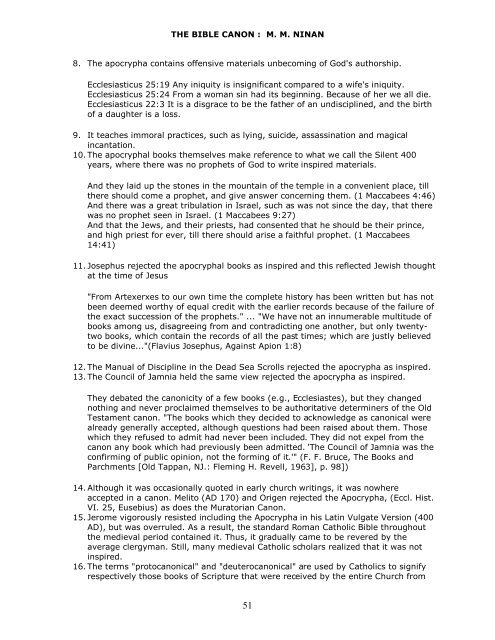Create successful ePaper yourself
Turn your PDF publications into a flip-book with our unique Google optimized e-Paper software.
THE BIBLE CANON : M. M. NINAN<br />
8. The apocrypha contains offensive materials unbecoming of God's authorship.<br />
Ecclesiasticus 25:19 Any iniquity is insignificant compared to a wife's iniquity.<br />
Ecclesiasticus 25:24 From a woman sin had its beginning. Because of her we all die.<br />
Ecclesiasticus 22:3 It is a disgrace to be the father of an undisciplined, and the birth<br />
of a daughter is a loss.<br />
9. It teaches immoral practices, such as lying, suicide, assassination and magical<br />
incantation.<br />
10. The apocryphal books themselves make reference to what we call the Silent 400<br />
years, where there was no prophets of God to write inspired materials.<br />
And they laid up the stones in the mountain of the temple in a convenient place, till<br />
there should come a prophet, and give answer concerning them. (1 Maccabees 4:46)<br />
And there was a great tribulation in Israel, such as was not since the day, that there<br />
was no prophet seen in Israel. (1 Maccabees 9:27)<br />
And that the Jews, and their priests, had consented that he should be their prince,<br />
and high priest for ever, till there should arise a faithful prophet. (1 Maccabees<br />
14:41)<br />
11. Josephus rejected the apocryphal books as inspired and this reflected Jewish thought<br />
at the time of Jesus<br />
"From Artexerxes to our own time the complete history has been written but has not<br />
been deemed worthy of equal credit with the earlier records because of the failure of<br />
the exact succession of the prophets." ... "We have not an innumerable multitude of<br />
books among us, disagreeing from and contradicting one another, but only twentytwo<br />
books, which contain the records of all the past times; which are justly believed<br />
to be divine..."(Flavius Josephus, Against Apion 1:8)<br />
12. The Manual of Discipline in the Dead Sea Scrolls rejected the apocrypha as inspired.<br />
13. The Council of Jamnia held the same view rejected the apocrypha as inspired.<br />
They debated the canonicity of a few books (e.g., Ecclesiastes), but they changed<br />
nothing and never proclaimed themselves to be authoritative determiners of the Old<br />
Testament canon. "The books which they decided to acknowledge as canonical were<br />
already generally accepted, although questions had been raised about them. Those<br />
which they refused to admit had never been included. They did not expel from the<br />
canon any book which had previously been admitted. 'The Council of Jamnia was the<br />
confirming of public opinion, not the forming of it.'" (F. F. Bruce, The Books and<br />
Parchments [Old Tappan, NJ.: Fleming H. Revell, 1963], p. 98])<br />
14. Although it was occasionally quoted in early church writings, it was nowhere<br />
accepted in a canon. Melito (AD 170) and Origen rejected the Apocrypha, (Eccl. Hist.<br />
VI. 25, Eusebius) as does the Muratorian <strong>Canon</strong>.<br />
15. Jerome vigorously resisted including the Apocrypha in his Latin Vulgate Version (400<br />
AD), but was overruled. As a result, the standard Roman Catholic <strong>Bible</strong> throughout<br />
the medieval period contained it. Thus, it gradually came to be revered by the<br />
average clergyman. Still, many medieval Catholic scholars realized that it was not<br />
inspired.<br />
16. The terms "protocanonical" and "deuterocanonical" are used by Catholics to signify<br />
respectively those books of Scripture that were received by the entire Church from<br />
51


















